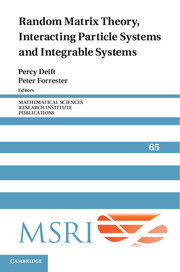Book contents
- Frontmatter
- Contents
- Preface
- Universality conjecture for all Airy, sine and Bessel kernels in the complex plane
- On a relationship between high rank cases and rank one cases of Hermitian random matrix models with external
- Riemann–Hilbert approach to the six-vertex model
- CLT for spectra of submatrices of Wigner random matrices, II: Stochastic evolution
- Critical asymptotic behavior for the Korteweg–de Vries equation and in random matrix theory
- On the asymptotics of a Toeplitz determinant with singularities
- Asymptotic analysis of the two-matrix model with a quartic potential
- Conservation laws of random matrix theory
- Asymptotics of spacing distributions 50 years later
- Applications of random matrix theory for sensor array imaging with measurement noise
- Convolution symmetries of integrable hierarchies, matrix models and τ-functions
- Universality limits via “old style” analysis
- Fluctuations and large deviations of some perturbed random matrices
- Three lectures on free probability
- Whittaker functions and relatedstochastic processes
- How long does it take to compute the eigenvalues of a random symmetric matrix?
- Exact solutions of the Kardar–Parisi–Zhang equation and weak universality for directed random polymers
- Replica analysis of the one-dimensional KPZ equation
- Asymptotic expansions for β matrix models and their applications to the universality conjecture
- KPZ scaling theory and the semidiscrete directed polymer model
- Experimental Realization Of Tracy–Widom Distributions And Beyond: Kpz Interfaces In Turbulent Liquid Crystal
- Random matrices: the four-moment theorem for Wigner ensembles
How long does it take to compute the eigenvalues of a random symmetric matrix?
Published online by Cambridge University Press: 29 May 2025
- Frontmatter
- Contents
- Preface
- Universality conjecture for all Airy, sine and Bessel kernels in the complex plane
- On a relationship between high rank cases and rank one cases of Hermitian random matrix models with external
- Riemann–Hilbert approach to the six-vertex model
- CLT for spectra of submatrices of Wigner random matrices, II: Stochastic evolution
- Critical asymptotic behavior for the Korteweg–de Vries equation and in random matrix theory
- On the asymptotics of a Toeplitz determinant with singularities
- Asymptotic analysis of the two-matrix model with a quartic potential
- Conservation laws of random matrix theory
- Asymptotics of spacing distributions 50 years later
- Applications of random matrix theory for sensor array imaging with measurement noise
- Convolution symmetries of integrable hierarchies, matrix models and τ-functions
- Universality limits via “old style” analysis
- Fluctuations and large deviations of some perturbed random matrices
- Three lectures on free probability
- Whittaker functions and relatedstochastic processes
- How long does it take to compute the eigenvalues of a random symmetric matrix?
- Exact solutions of the Kardar–Parisi–Zhang equation and weak universality for directed random polymers
- Replica analysis of the one-dimensional KPZ equation
- Asymptotic expansions for β matrix models and their applications to the universality conjecture
- KPZ scaling theory and the semidiscrete directed polymer model
- Experimental Realization Of Tracy–Widom Distributions And Beyond: Kpz Interfaces In Turbulent Liquid Crystal
- Random matrices: the four-moment theorem for Wigner ensembles
Summary
We present the results of an empirical study of the performance of the QR algorithm (with and without shifts) and the Toda algorithm on random symmetric matrices. The random matrices are chosen from six ensembles, four of which lie in the Wigner class. For all three algorithms, we observe a form of universality for the deflation time statistics for random matrices within the Wigner class. For these ensembles, the empirical distribution of a normalized deflation time is found to collapse onto a curve that depends only on the algorithm, but not on the matrix size or deflation tolerance provided the matrix size is large enough. For the QR algorithm with the Wilkinson shift, the observed universality is even stronger and includes certain non-Wigner ensembles. Our experiments also provide a quantitative statistical picture of the accelerated convergence with shifts.
1. Introduction
We present the results of a statistical study of the performance of the QR and
Toda eigenvalue algorithms on random symmetric matrices. Our work is mainly
inspired by progress in quantifying the “probability of difficulty” and “typical
behavior” for several numerical algorithms [Demmel 1988; Goldstine and von
Neumann 1951]. This approach has led to a deeper understanding of the efficacy
of fundamental numerical algorithms such as Gaussian elimination and the
simplex method [Rudelson and Vershynin 2008; Sankar et al. 2006; Smale
1983; Tao and Vu 2010]. It has also stimulated new ideas in random matrix
theory [Dumitriu and Edelman 2002; Edelman 1988; Edelman and Sutton 2007].
Testing eigenvalue algorithms with random input continues this effort. In related
work [Pfrang 2011], we have also studied the performance of a version of the
matrix sign algorithm. However, these results are of a different character, and apart from some theoretical observations, we do not present any experimental results for this algorithm (see [Pfrang 2011] for more information). Our study is empirical—a study of the eigenvalue problem from the viewpoint of complexity theory is presented in [Armentano 2014].
1.1. Algorithms and ensembles.It is natural to study the QR algorithm because of its elegance and fundamental practical importance. But in fact all the algorithms we study are linked by a common framework. In each case, an initial matrix L0 is diagonalized via a sequence of isospectral iterates Lm. The gist of the framework is that the Lm correspond exactly to the flow of a completely integrable Hamiltonian system evaluated at integer times.
Information
- Type
- Chapter
- Information
- Publisher: Cambridge University PressPrint publication year: 2014
